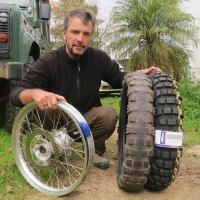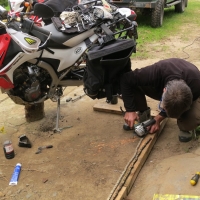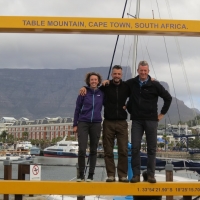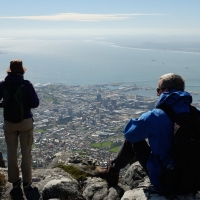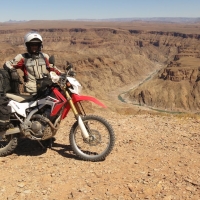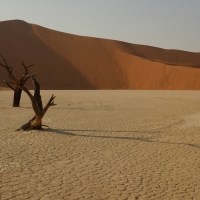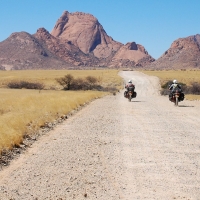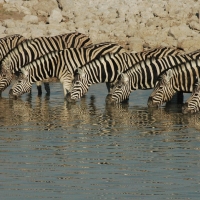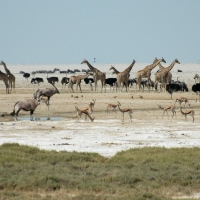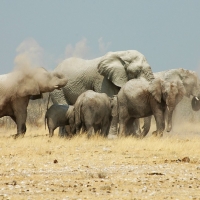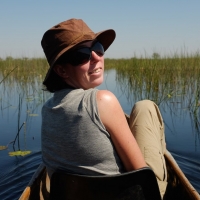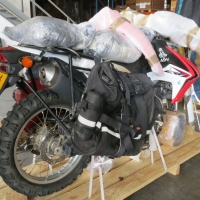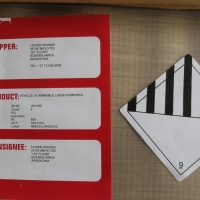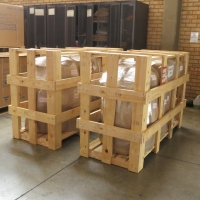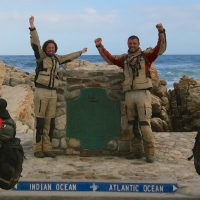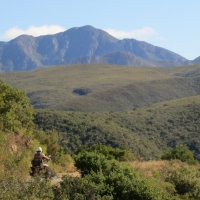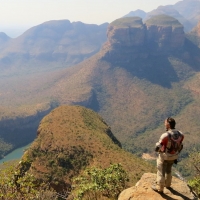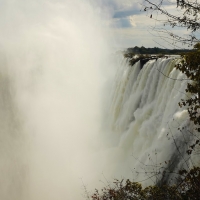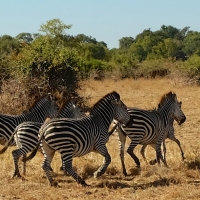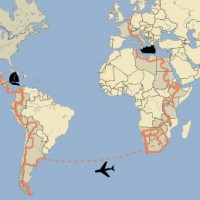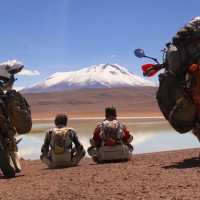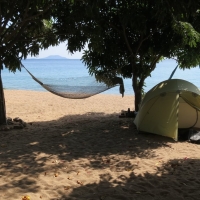 After our underwater adventure we do not get back on the bikes just yet. We heard about Likoma, a beautiful island in Lake Malawi. A tropical destination with a campsite on the beach, lounge chairs at the waterfront and dinner under the stars. From Nkhata Bay a boat leaves to Likoma twice a week. And that boat just happens to leave on the morning after we have completed our three-day diving course.
After our underwater adventure we do not get back on the bikes just yet. We heard about Likoma, a beautiful island in Lake Malawi. A tropical destination with a campsite on the beach, lounge chairs at the waterfront and dinner under the stars. From Nkhata Bay a boat leaves to Likoma twice a week. And that boat just happens to leave on the morning after we have completed our three-day diving course.
We can leave the motorbikes with Kelly-Ann and Simon in the garage of the diving school. Without our faithful steel steeds, but with the camping gear we leave early the next morning to the ship. It is already crowded in the small harbour. The boat is not only the ferry for the islanders, but also takes supplies to the island. At the quay are high stacks of boxes, bags and sacks that are carried onto the ship one by one.
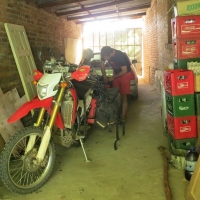 We make our way passed Coca Cola crates and sacks of dried fish and buy a ticket for the second class. The cabin is already quite busy. We find a spot and wait for the ship to leave. It looks like this might still take a while, because the high stacks of cargo on the quay are not getting any lower. An hour after we came on board, the horn finally sounds. As the sun rises over Lake Malawi the ship slowly starts to move.
We make our way passed Coca Cola crates and sacks of dried fish and buy a ticket for the second class. The cabin is already quite busy. We find a spot and wait for the ship to leave. It looks like this might still take a while, because the high stacks of cargo on the quay are not getting any lower. An hour after we came on board, the horn finally sounds. As the sun rises over Lake Malawi the ship slowly starts to move.
Likoma is only 65km as the crow flies from Nkhata Bay, yet the crossing will take nearly eight hours. This is mainly due to the stopover on the adjacent island, Chizumulu. We lay at anchor there for nearly two hours while part of the boxes and crates is unloaded. There is no harbour on the island, so all the cargo has to be carried into small row boats that take it to the island. It goes in a typically African and none efficient way, but it is a good ’show’ to watch.
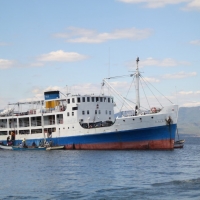 After two hours the horn sounds again and we leave for the last part of the trip. Peter and I are not the only tourists on the ship. We sit next to several packed backpacks and on deck are even three ‘travelling bicycles’ full with camping gear. During the crossing it appears all tourists are on their way to Mango Drift Camp. An hour after we left Chizumulu we arrive at Likoma. There is no harbour here either, so just like at our last stop all passengers and all cargo has to be taken to the beach in small boats.
After two hours the horn sounds again and we leave for the last part of the trip. Peter and I are not the only tourists on the ship. We sit next to several packed backpacks and on deck are even three ‘travelling bicycles’ full with camping gear. During the crossing it appears all tourists are on their way to Mango Drift Camp. An hour after we left Chizumulu we arrive at Likoma. There is no harbour here either, so just like at our last stop all passengers and all cargo has to be taken to the beach in small boats.
After the first boats went back and forth a few times, we slowly move toward the exit. It is still very busy. We have to climb over the remaining bags of dried fish. Peter is the first to reach the small boat. While I struggle to remain standing on my two feet in the pushing crowd, I hand him our two bags. A scary crossing high above the water. I am one of the last passengers to get into the motor boat. 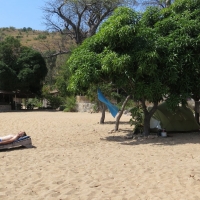 We are both still wearing our shoes, but quickly take them off when we see that we have to wade through the water to get onto the beach. With the laces tied together, we hang our shoes around our necks and we walk through the knee-deep water to the beach.
We are both still wearing our shoes, but quickly take them off when we see that we have to wade through the water to get onto the beach. With the laces tied together, we hang our shoes around our necks and we walk through the knee-deep water to the beach.
There is a pick-up waiting to bring us to the campsite. We climb with our bags in the back of the pick-up with the other guests and drive on a bumpy dirt road to the other side of the island. Just like on the mainland of Malawi there are huge baobab trees here, beautiful! The pick-up drops us off in a small village, where we start a hike to the campsite. Not long after that, we drop down our heavy bags next to a hammock that is hanging between two mango trees. As we pitch our tent, I cannot help humming happily.
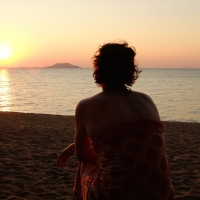 We end up staying three nights at Likoma and leave to take the next boat back to the mainland. In those days on the island we actually do nothing. Well, we read a book and swim. We chat with the other guests at Mango Drift. We meet Jevan, Roland and Leonard from South Africa who are on their way to Zanzibar on their bicycles (Facebook). We take another ride in the pick-up to the local bar to see how the Dutch soccer team only just beats Australia. We enjoy the delicious food served on the beach under the stars. We sigh while looking at yet another beautiful African sunset. And we remain ’lazy loungers’ until it is time to get back to Nkhata Bay. With the pick-up to the beach, with a small boat to the ship and with the ship back to the motorbikes.
We end up staying three nights at Likoma and leave to take the next boat back to the mainland. In those days on the island we actually do nothing. Well, we read a book and swim. We chat with the other guests at Mango Drift. We meet Jevan, Roland and Leonard from South Africa who are on their way to Zanzibar on their bicycles (Facebook). We take another ride in the pick-up to the local bar to see how the Dutch soccer team only just beats Australia. We enjoy the delicious food served on the beach under the stars. We sigh while looking at yet another beautiful African sunset. And we remain ’lazy loungers’ until it is time to get back to Nkhata Bay. With the pick-up to the beach, with a small boat to the ship and with the ship back to the motorbikes.
It is already pitch black when we return to Nkhata Bay after a rough journey. I have spent almost the entire trip sitting in the wind being seasick and am glad that I can step onto the dry land again. 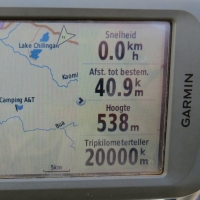 Travelling around the world in a sailing boat will definitely be the last thing I will ever do! Kelly-Ann and Simon are already waiting for us in the harbour. After we have put our stuff in their guest room, we go to Kaya Papaya for a plate of delicious Thai red curry!
Travelling around the world in a sailing boat will definitely be the last thing I will ever do! Kelly-Ann and Simon are already waiting for us in the harbour. After we have put our stuff in their guest room, we go to Kaya Papaya for a plate of delicious Thai red curry!
After a pleasant evening we take our motorbikes out of the garage again the next morning. Since the boat trip between Egypt and Sudan, this was the first time that we left them somewhere. It is great to see them again and to hear them start without any problems on the first try. It is nice to stay in one place a bit longer, but it is as nice to get on the road again after that! With fresh energy, the wind blowing in our faces and the gently humming of the engines below us, we drive along the lake towards Nkhotakota. We have already spent a lot of time on our trusty Hondas during this trip and today achieve a milestone: 20,000 km! Amazing how far our small motorbikes have taken us during this trip.
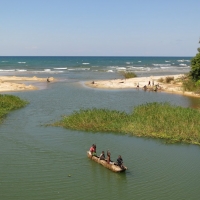 After a stormy night in Nkhotakota it still is a half-day drive to Lilongwe, the capital of Malawi. We find a camping spot at a campsite in the south of the city. After dinner we take a look of the map of Southern Africa to take a decision on the rest of our route. In Uganda we responded to an ad to watch a campsite near Cape Town for three weeks while the owners go on holiday. A nice chance to look behind the scenes of a campsite but also a good moment to prepare our motorbikes for the second part of our trip. We still have a month to reach Cape Town and now need to make choices about the route we will take and the countries we will visit in that month. We decide to skip southern Malawi and Mozambique (read: save that for next time) and ride through Zambia and Zimbabwe to South Africa as of tomorrow.
After a stormy night in Nkhotakota it still is a half-day drive to Lilongwe, the capital of Malawi. We find a camping spot at a campsite in the south of the city. After dinner we take a look of the map of Southern Africa to take a decision on the rest of our route. In Uganda we responded to an ad to watch a campsite near Cape Town for three weeks while the owners go on holiday. A nice chance to look behind the scenes of a campsite but also a good moment to prepare our motorbikes for the second part of our trip. We still have a month to reach Cape Town and now need to make choices about the route we will take and the countries we will visit in that month. We decide to skip southern Malawi and Mozambique (read: save that for next time) and ride through Zambia and Zimbabwe to South Africa as of tomorrow.
Total distance to Lilongwe: 20,243 km! (12,578 miles)
Click here to view the photos.
Previous story “Malawi, above the water and underwater” – Next story “Secret of Africa“
Lees meer (Read more)













